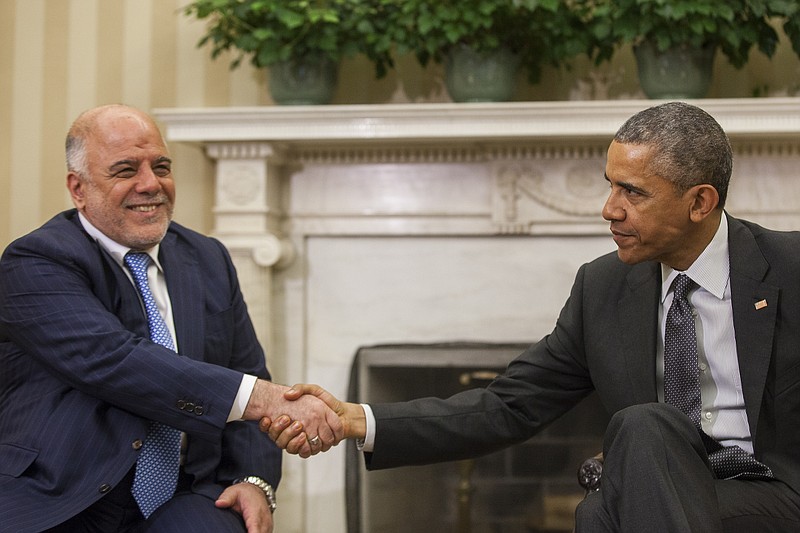WASHINGTON - The Obama administration and the Islamic State both issued new manifestos for the battle in Iraq this week. Guess which one is more forceful?
The U.S. plan is to add 450 additional military advisers who will train Sunni tribal fighters at an airbase in Anbar province. It's a careful, incremental step. The American troops won't go into battle with the Iraqis, they won't call in airstrikes, and they'll mostly remain inside the protected compound. The hope is to recruit Sunnis to support a Shiite-led government that many of them oppose.
The Islamic State's message, meanwhile, is that it will continue its rampage and compel Sunnis to accept its rule. This is a ruthless campaign, and it has momentum. A powerful video released Thursday celebrates the group's victories since the capture of Mosul last June. The slick film, called "A Year After the Conquest," is 30 minutes of raw, blood-curdling violence. The message is that the Sunni jihadists are unstoppable.
The U.S. is fighting an uphill battle, partly because it is trying to build a coalition of Iraqis who fear and sometimes loath each other. It's an admirable strategy, in human terms, seeking to counter sectarianism and hold the Iraqi state together. But it hasn't been working, and the changes announced this week aren't likely to produce any quick improvement. The U.S. moves at least won't make things worse, and they leave open the way for the political reconciliation that is Iraq's only salvation.
A voice against sectarianism is Salim al-Jibouri, a Sunni who is speaker of the Iraqi parliament and an ally of Prime Minister Haider al-Abadi. He was in Washington this week making the case that Sunni tribal fighters should work with the government to retake Mosul, Ramadi and other Sunni areas that have been overrun.
It sounds reasonable enough, until you talk to some of those tribal leaders. A small parade of them has been visiting Washington recently seeking money and support. A common theme is that they don't trust Abadi. Many say they won't fight with the government unless it checks the power of the Iranian-backed Shiite militias, which match the Islamic State in ruthlessness and sectarian hatred.
The grim situation in Ramadi illustrates why it's so hard to convince Sunnis to work with the government. After the Iraqi army collapsed and abandoned the city last month, Sunnis fled by the thousands toward Baghdad, seeking safety from the Islamic State's onslaught. They were turned back, often by Shiite militias, and in their desperation, many returned home. The jihadists are said to have offered families amnesty if they agreed to enroll their sons as fighters with the Islamic State.
"Iraqis don't want to live under the Islamic State, but where are they supposed to go?" asks Sheikh Zaydan al-Jibouri, a tribal leader from Ramadi. The jihadist group's offer of amnesty in Ramadi shows that it "has changed its strategy over the last six months" and is now "trying to win hearts and minds to get a foundation," he explains. The right response isn't just American guns and money, he says, but more political power for Iraqi Sunnis.
"This is put up or shut up time for the tribes," says one U.S. official. "If the tribes can send their fighters, they will be armed and trained by the best Special Operations forces in America." One tribal leader from Ramadi just promised 1,500 recruits. Multiply that a dozen times and the U.S. strategy will gain some traction.
But I'd bet that what Iraqi Sunnis are watching this week is the triumphal Islamic State video, not the news from Washington. It shows beheadings, stonings, point-blank assassinations and wanton destruction of Shiite mosques and Christian churches. Tragically, that's the face of this war.
Over more than 10 years of U.S. Iraq policy, through two administrations and the flood tides of invasion and withdrawal, surge and retreat, the one thing that doesn't appear to have changed is America's yearning that its Iraqi allies can somehow prevail in this killing field. Maybe someday, but the chilling video warns us it isn't likely to be soon.
Washington Post Writers Group
